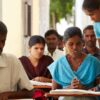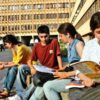Annual education survey reveals poor cognitive skills among 4-8 year olds
According to the Annual Status of Education Report (ASER) 2019, released by NGO Pratham on January 15, 2020, only 41 percent children could recognise two-digit numbers while only 16 percent children studying in Class 1 in 26 surveyed rural districts can read text at the prescribed level. Almost 40 percent cannot even recognise letters.
The survey also revealed that 46.2 percent of class 3 children from Lucknow, and 45.9 percent of children from Varanasi are unable to read or recognise 1-100 numbers.
For the survey, ASER surveyors covered a total of 36,930 children in the age group of 4-8 years in 26 rural districts across 24 states, wherein they asked each child to perform a variety of tasks that would test their cognitive skills, literacy as well as numeracy knowledge. Furthermore, social and emotional development was tracked through activities.
The survey stated that among class one children who couldn’t perform more than one task, only 14 percent could read words, while 19 percent could do single-digit addition. Among the children who did all three cognitive tasks, 52 percent could read words, and 63 percent could solve addition problems.
The report read, “Although almost half of four-year-olds (44.2 percent) and more than a quarter of all five-year-olds (26.3 percent) are enrolled in anganwadis, these children have far lower levels of cognitive skills and foundational ability than their counterparts in private LKG and UKG classes.”
It further added, “ASER data shows that children’s performance on tasks requiring cognitive skills is strongly related to their ability to do early language and numeracy tasks. This suggests that focussing on play-based activities that build memory, reasoning and problem-solving abilities is more productive than an early focus on content knowledge.”
The report also found that more than a quarter of class 1 students in government schools are only 4 or 5 years old, which is younger than the recommended age. The report said, “Permitting underage children into primary grades puts them at a learning disadvantage which is difficult to overcome.”

















Add comment